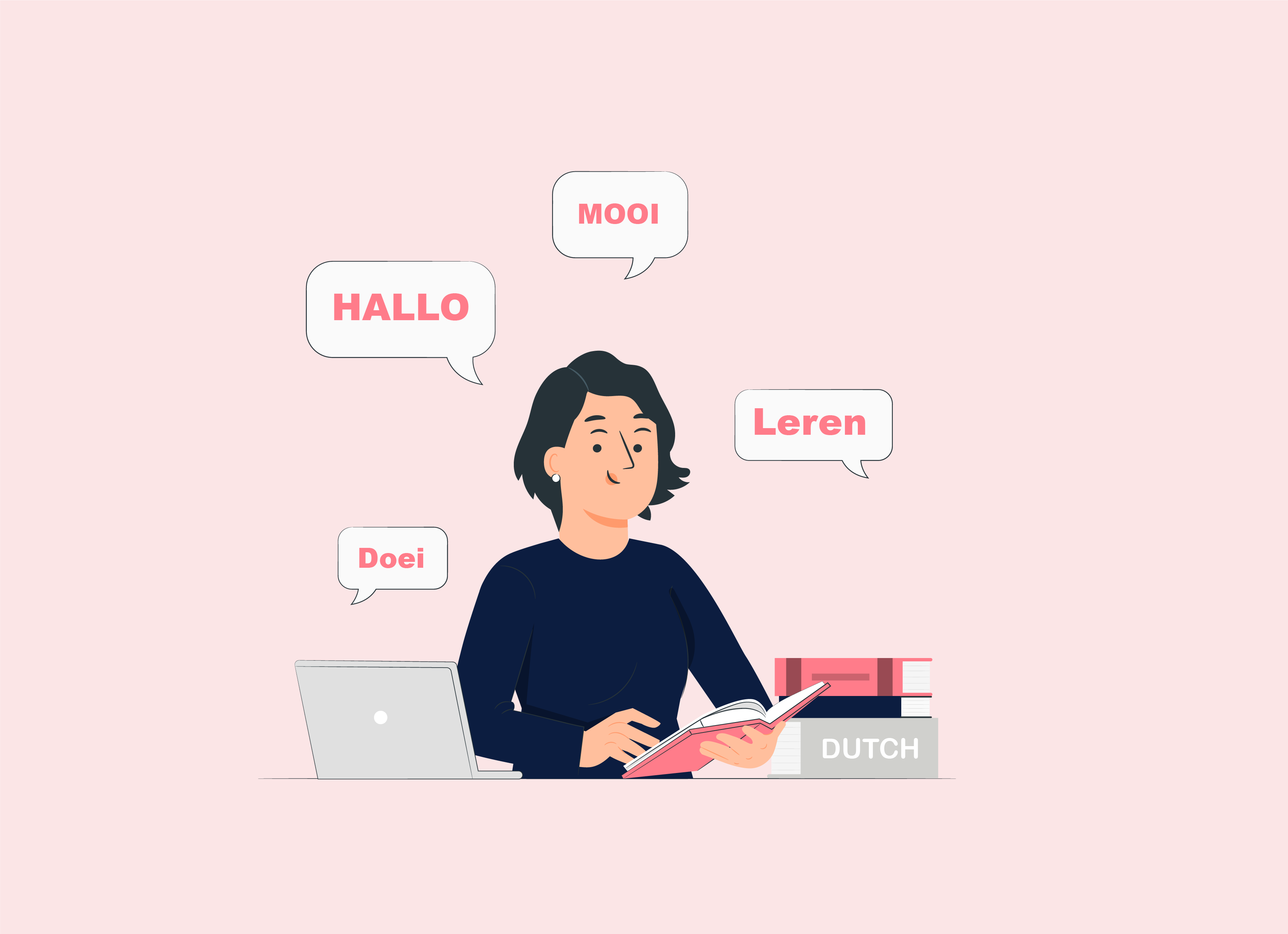
We at Octagon Professionals are made up of a team of expats and internationals from all over the world. So many members of our team have first-hand experience about what it’s like to be an expat and live in a brand-new country. Their experiences and perspectives are what enables our firm to provide HR services perfectly tailored to the needs of international companies who are new to the Netherlands.
This week, we are privileged to share a personal submission from Laura, who comes from Colombia. She shared her introspective journey to uncover the value of learning Dutch to form connections and embrace the local culture:
“When I first visited the Netherlands as a tourist, one of the things that struck me the most was the fact that nearly everyone I interacted with spoke English, and they did so almost perfectly. It was quite a surprise for me, coming from a country where the percentage of people with access to a second language is very low. Witnessing people of all ages, from children to the elderly, communicating in the universal language was nothing short of magical.
Indeed, this played a significant role in my decision to choose this country as a destination to build my personal and professional future. However, while it’s true that one can thrive in this country without the need to learn its language, I couldn’t help but realize that speaking Dutch brings substantial advantages in all aspects of life. Much like in all those countries where you are compelled to learn the local language to survive, life in the Netherlands when you speak Dutch is an entirely different reality.
Did you know?
The Dutch language is the third most widely-spoken Germanic language globally, with nearly 23 million speakers, according to University College London, and it’s officially recognized in six countries.
While it might not sound as impressive as the billion English speakers, if you plan to extend your stay in the Netherlands, it’s worth considering the advantages of learning the language.
Is learning Dutch that important?
Well, like everything else in this life, I think it is a matter of perspective. I had the opportunity to speak with some of my colleagues at Octagon, both Dutch and non-Dutch, and gathered some fair insights from each point of view.
– Building Relations:
Making friends when you are an adult in a foreign country is never easy, regardless of the language people speak. If you add that to the fact that must Dutch people tend to decide who are going to be their friends for the rest of their life when they are in high school, then yes, you can imagine it is very hard to start a friendship with a Dutch person.
But, in the Netherlands this doesn’t represent a problem per se. You have access to almost every other nationality of the world, so you will always manage to connect with someone. Nevertheless, if your intention is to live in this country long-term, it is worthwhile to make Dutch friends. Having Dutch friends is like having a real treasure in your life. They are honest, loyal, and they have got the biggest hearts.
In my case, I’m lucky to have a Dutch partner who is perfectly fine speaking English with me all the time. However, there comes a point, in our social interactions with other Dutchies, when it is just simpler to switch to Dutch. I totally get it, no judgment here, Dutch expressions and jokes lose their charm when translated into English.
“When you know the language, it makes it easier to connect with someone, at least knowing some words.”
“Language sparks more interest; it makes you more excited when you have a language in common with someone.”
I think, as foreigners, many of us have felt the warmth of connecting with someone who shares our language, wherever they are from. It’s like an immediate bond, a quick feeling of understanding and empathy. That is why it’s so important to immerse yourself in learning the language of the place where you live, it brings you closer to the people in a special way.
– Work based:
The Netherlands often feels like a dreamland for those seeking work opportunities abroad. It provides numerous advantages in a European setting, and the best part is, you don’t even need to master a third language to thrive here.
However, what many of us expats residing and working in the Netherlands tend to overlook over time is the massive impact that learning the local language can have on our access to certain opportunities and our interpersonal connections.
Speaking from our perspective at Octagon, which is a diverse and international environment, you might think that knowing Dutch isn’t a necessity for excelling in your role. And you know what? You are kind of right. Dutch people (in general) speak English at a very high level. But as with everything in life, there does come a time when you can hit a roadblock or experience delays in processes due to language differences.
“For example, because of our job, we call a lot with the IND and Belastingdienst, and these people mostly talk in Dutch whilst in the phone. So, if you don’t speak their language, they get frustrated with you also because you don’t understand each other. If we see it in that sense, yes, it is very important to know the language.”
– Daily life:
It happened to me once, I was going from The Hague to Amsterdam by train and the train suddenly stopped in the middle of nowhere, there was an announcement in Dutch and at least one hour of waiting until we could continue our journey. To this day I still don’t know what happened, and like this, there have been several times when I just feel lost in my daily life here in the Netherlands. Have you ever experienced that strange dullness? It’s like that feeling of not understanding, but also not feeling comfortable enough to ask someone to translate for you. Even after living here for quite some time, I still feel like that, like an outsider, a tourist in my own life.
Even though I fight with the idea of being compelled to learn a new language just to live in a country, I can now see where that intention comes from. I stopped thinking about it as an obstacle and start to see it as a window of opportunity to truly belong and be part of Dutch society. Sometimes we underestimate the weight that feeling a sense of belonging has in our lives.
Tips:
If you made it to this point, I hope I managed to create some positive feeling towards learning Dutch (or any other language). To conclude I gathered some of the tips that my Dutch colleagues gave us to motive ourselves to learn their language while living here. Thank you to all for participating in giving me your opinions.
- “Don’t be afraid to start talking or asking people to repeat for you. I think Dutch people would be glad to help. It’s cute when someone tries to learn Dutch, because you don’t need it and still you make the effort.”
- “Try to implement it in your daily life, watching movies with Dutch subtitles and so on.”
- Buy some nice children’s books or simple stories to read. They offer easy vocabulary and make learning a truly enjoyable experience.
- Consider volunteering. It’s a wonderful way to become part of the community. You will occasionally encounter non-English speakers, and it’s a great way to forge connections with people who are eager to help you practice.
- Keep a little word book with you and write down words you come across in your daily life, whether on the tram, at the supermarket, or in the gym. Try to memorize them and use any opportunity to include them in conversations with Dutch speakers.
- If you want to go all in, I recommend you check some courses that could help you learn faster. You can search the academies that are certified by DUO (Dienst Uitvoering Onderwijs), the government educational agency.
Connection
I believe that people deeply appreciate it when someone invests effort in learning their language. This effort demonstrates a genuine interest for connection, and connection is inherently appealing to us. It’s like the real-life version of “I see you” from Avatar; it’s a way of signalling, “You are one of mine”. That’s how incredibly connected language is to our lives and for me that will sum up the importance of trying to learn this incredible language.”
At Octagon Professionals, we strive to make the journey of expansion for your business, and employees, as painless as possible. Contact us to learn more about how Octagon Professionals can support you with HR matters.
more news

What makes the Netherlands an attractive destination for expats
07-09-23
If you are looking for reasons to decide to move to the Netherlands, you are in the right place. Whether you want to start a business, study, or go in search of a new professional direction, the country of windmills ...

What permit do non-EU professionals need to work in the Netherlands?
18-08-23
Are you looking to move and work in the Netherlands? We understand, there are a multitude of reasons that drive international professionals to come here to find work. The multicultural society, the high level and density of English proficiency, the ...